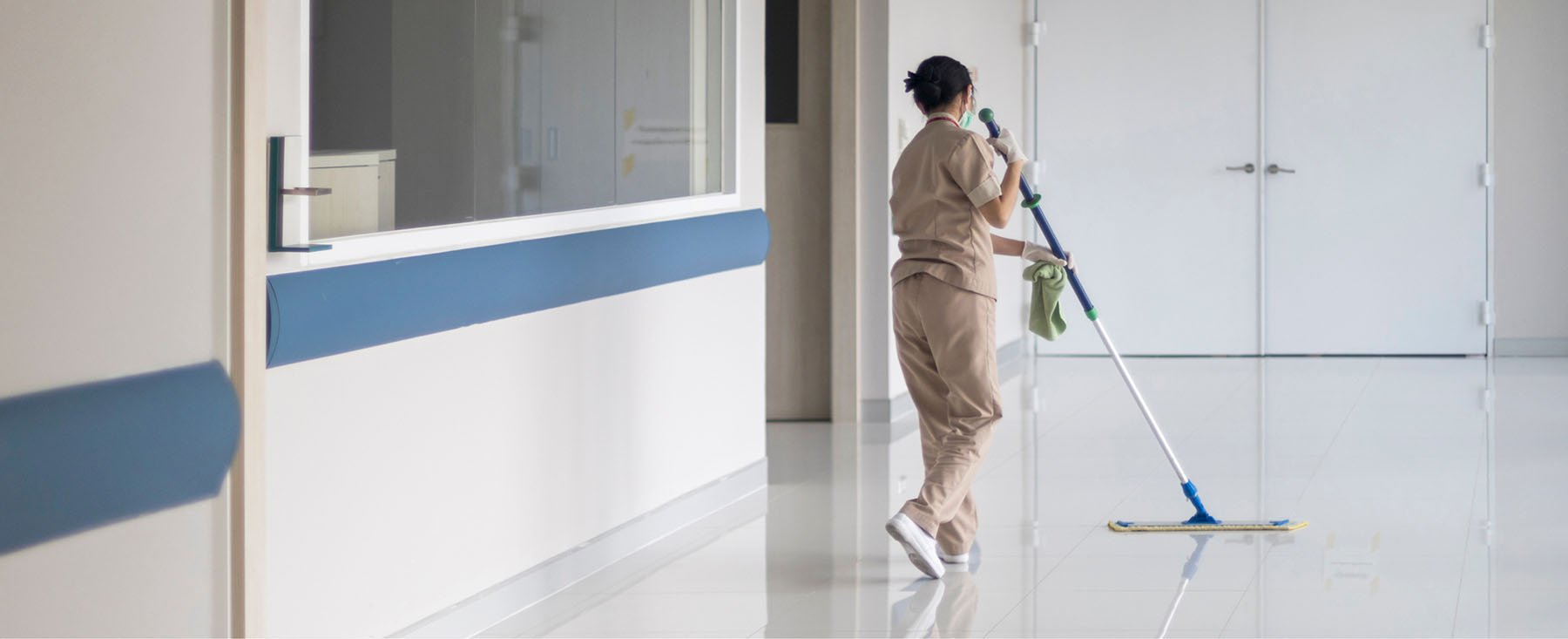
Types of Floor Cleaning Chemicals – Varieties and Best Practices
A crucial part of housekeeping is matching cleaner to surface.
Using the wrong type of cleaner on a floor can be catastrophic. It could lose you customers and credibility. The wrong floor cleaner could damage the flooring material, and repairs can be costly.
This article breaks down the best cleaning chemicals to use on each type of floor. Share it with your housekeeping team to ensure effective and safe cleaning practices, ensuring the longevity and aesthetics of the floors you clean.
The Best Cleaners for Each Floor Type
Concrete Floors: Concrete floors require alkaline or pH-neutral cleaners for effective cleaning. Hard floor cleaning chemicals can remove grease and other heavy soils without damaging the surface. Remember to always rinse thoroughly after cleaning.
Carpet Floors: Carpet floors benefit from specially formulated carpet cleaners capable of deep cleaning and removing stains. Avoid highly alkaline or acidic cleaners as they can damage the carpet fibers.
Marble Floors: Cleaners with a pH between 7 and 10 are best for marble to prevent etching or discolouration. Avoiding acidic or abrasive marble floor cleaner is crucial, as they can damage this sensitive material.
Tile Floors: Ceramic and porcelain tiles can handle most all-purpose cleaners or tile cleaning chemicals. However, tile grout requires specialised cleaners or a mild bleach solution to eliminate grime effectively.
Hardwood Floors: pH-neutral or slightly acidic cleaners are ideal for hardwood floors. They should be gentle, non-abrasive, and free of excess water to prevent damage to the finish and the wood.
Laminate Floors: Laminate flooring calls for gentle, water-based, pH-neutral cleaners. Abrasive or acidic cleaners can dull the surface or cause damage.
Linoleum Floors: Mild, pH-neutral cleaners work best on linoleum floors. These surfaces are sensitive to harsh chemicals, so a gentle solution will keep the linoleum in optimal condition.
Epoxy Floors: Non-corrosive, pH-neutral cleaners are ideal for epoxy floors. Since these floors are durable and non-porous, they can resist the most common contaminants, but harsh cleaners can harm the finish. Epoxy floor cleaner is often general purpose, as epoxy is very durable.
Vinyl Floors: Mild detergents or commercial vinyl cleaners work well for vinyl flooring. Ensure the cleaner is free of abrasive substances to maintain the floor's finish.
Terrazzo Floors: Terrazzo, a composite material of marble chips and binder, requires pH-neutral cleaners. Abrasive substances can damage the surface finish and should be avoided.
Bamboo Floors: Bamboo flooring prefers gentle, pH-neutral cleaners. Avoiding water-based or acidic cleaners is essential to prevent warping and discolouration.
Cork Floors: Specialised cork floor cleaners, which are gentle and pH-neutral, work best on this absorbent material. As with bamboo, avoid excess water to prevent warping.
Vinyl Floors: Mild detergents or commercial vinyl cleaners work well for vinyl flooring. Ensure the cleaner is free of abrasive substances to maintain the floor's finish.
Rubber Floors: Mild detergents or specially formulated rubber floor cleaners are recommended for rubber flooring. These surfaces can be sensitive to harsh chemicals, which can cause discolouration or damage.
Stone Floors: Natural stone floors such as granite, slate, or limestone require specialised pH-neutral stone cleaners. Granite floor cleaners that are acidic or highly alkaline cleaners can etch or stain the surface.
Brick Floors: Brick floors can handle most pH-neutral cleaners. Due to the porous nature of bricks, avoid excess water and rinse thoroughly to prevent a residue build-up.
Matching Cleaning Chemical to Floor Type
Flooring materials have unique physical and chemical properties that react differently to cleaning agents. When a cleaner is well-matched to the floor type, it optimises cleanliness while preserving the floor's original aesthetic and physical properties. Using an incompatible cleaner can lead to poor cleaning results and damage the floor.
For instance, acidic cleaners may offer excellent results on ceramic tiles, but using them on marble or limestone can result in etching or staining due to the stones' sensitivity to acid. Similarly, while vigorous scrubbing and strong detergent might be effective for a concrete floor, this approach would scratch and dull a hardwood or laminate floor.
Therefore, understanding the interaction between the floor type and its suitable cleaner is essential for effective and safe cleaning practices. By matching the cleaner to the floor type, cleaning professionals ensure their efforts enhance the beauty and longevity of the floors they care for, rather than inadvertently damaging them.
Before using any cleaning chemicals on surfaces, it is essential to carefully read and adhere to the manufacturer’s instructions provided on the product packaging and on the Safety Data Sheet. Failure to do so could lead to unintended consequences, including damage to surfaces, health risks, or inefficient cleaning. The instructions outline proper usage, dilution ratios, safety precautions, and compatibility with different materials.
Explore Our Range
As industry leaders in professional cleaning, we know our chemicals. Our essential range ensures spotless, hygienic environments every time.
Ready for a superior clean?

